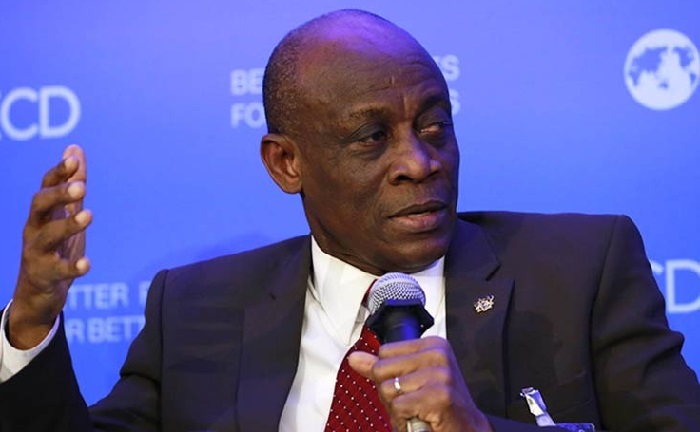
IMF negotiations: Approach with open mind - Tekper advises government
A former Minister of Finance, Seth Terkper, has advised the government to have an open mind in the ongoing discussions between it and the International Monetary Fund (IMF).
He said that would enable the two sides to fashion out the best possible solutions to the challenges facing the economy.
It would also allow the World Bank Group and other development partners (DPs) to leverage the existence of an IMF programme to support the government, as had always been the case, Mr Terkper, who was the Finance Minister when the country entered into the $918-million extended credit facility (ECF) in April 2015, said.
The former member of staff of the IMF added that any attempt to limit the discussions to one area of concern to the government would constrain the fund from proposing holistic solutions to the fiscal, monetary and structural challenges that forced the country into the IMF programme, the 18th since 1957.
Interview
The chartered accountant and public finance expert was speaking with the Daily Graphic yesterday on how the country could get the best from the fund in the upcoming programme meant to anchor the balance of payment (BOP) position and tackle the rising debt portfolio.
The bailout is also to reduce the fiscal deficit, bolster economic recovery and solidify institutional reforms to optimise growth.
Mr Terkper is most credited for leading the economic stabilisation after the 2012 elections, activating the country’s Sinking Fund, cleaning up government payroll of ghost names and introducing the Ghana Integrated Financial Management Information System (GIFMIS).
Bold step
While commending the government for the bold step to seek support under an IMF programme, Mr Terkper said the attempt to limit the remedy from the fund to BOP was unfair to the Bank of Ghana (BoG) and also unrealistic, especially given the challenges currently facing the economy.
He said the strong debt build-up since 2018 and the resulting large fiscal deficits were issues of concern that any IMF programme would seek to address.
He, therefore, wondered why the government would narrow down issues of interest in a possible IMF programme to only BOP, as was communicated to the public in the official announcement by the Information Minister, Kojo Oppong Nkrumah, and in subsequent comments by various government functionaries.
Statement
“The statement from the Information Minister said the government was seeking support to address BOP challenges.
“As a nation, we should look beyond BOP. Even if the BoG has difficulties with BOP, it means that the reserves are low, and they are low because there is a fi scal problem,” he said.
Mr Terkper mentioned the government’s discount policy on imports, spearheaded by Vice-President Mohamudu Bawumia, and the BoG’s financing of the budget in 2020 as some of the fi scal actions that cost the country pricy reserves, leading to the challenges in the BoP position.
“So the government needs to see the problem beyond BOP and go with an open mind because the support will go beyond BOP,” he said.
World Bank support
Mr Terkper said beyond limiting the solutions that could be proffered, a fixation on BOP would make it difficult for the World Bank Group and other DPs to leverage the IMF programme to support the country.
“Normally, when you go for an IMF programme, there are structural and budget elements to it.
“These unlock support from the World Bank and DPs, but that cannot happen if we make it look as though we are going exclusively for BOP support,” he said.
Challenges predate COVID-19
Mr Terkper insisted that the fiscal challenges that necessitated the current resort to the IMF predated the COVID-19 pandemic and the Russia/Ukraine war, hence the need for a broader outlook to help secure sustainable solutions.
Citing the sentiments of the BoG as bases, the former Finance Minister said, for instance, that the central bank had noted in its May 2020 Monetary Policy Committee (MPC) press statement that its GH¢10 billion financing of the deficit in 2020 had little to do with the COVID-19 pandemic.
“The BoG said the support for the government did not have anything to do with COVID-19, but that the government needed funds and if it went to the market, the cost would be higher.
“At the time the funding was given, government had conservatively $4 billion from the IMF and the Ghana Stabilisation Fund, which were in foreign exchange,” he said.
“But these went into funding the budget, not necessarily to strengthen the BOP, and that was because the fiscals were the problem, not the BOP,” Mr Terkper indicated.
He added that the Governor of the BoG, Dr Ernest Addison, had repeatedly alluded to rising expenditure as a threat to the then fi scal consolidation efforts.
Background
Last Friday, President Nana Addo Dankwa Akufo-Addo directed the Finance Minister, Ken Ofori-Atta, to open discussions with the IMF towards securing a programme to support the economy.
It followed the emergence of the COVID-19 pandemic and the Russia/Ukraine war, which worsened the country’s preexisting economic challenges, resulting in increased debt accumulation, rising inflation, a weakening cedi and the depletion of international reserves.
A credit downgrade earlier this year also led to the country being denied access to the international capital market for borrowing, at a time when domestic revenue mobilisation had weakened.
Following the directive, an IMF Team, led by its Mission Chief, Carlo Sdralevich, arrived in the country last Tuesday and has been holding discussions with the government with the hope of gathering suffi cient data for negotiations to begin.
Since independence, the country has resorted to IMF support 17 times, the most recent being a $918-million facility that ended in 2019.
In 2020, the fund also supported the government with a $1-billion free unconditional loan to quicken the economy’s recovery from the COVID-19 pandemic.
